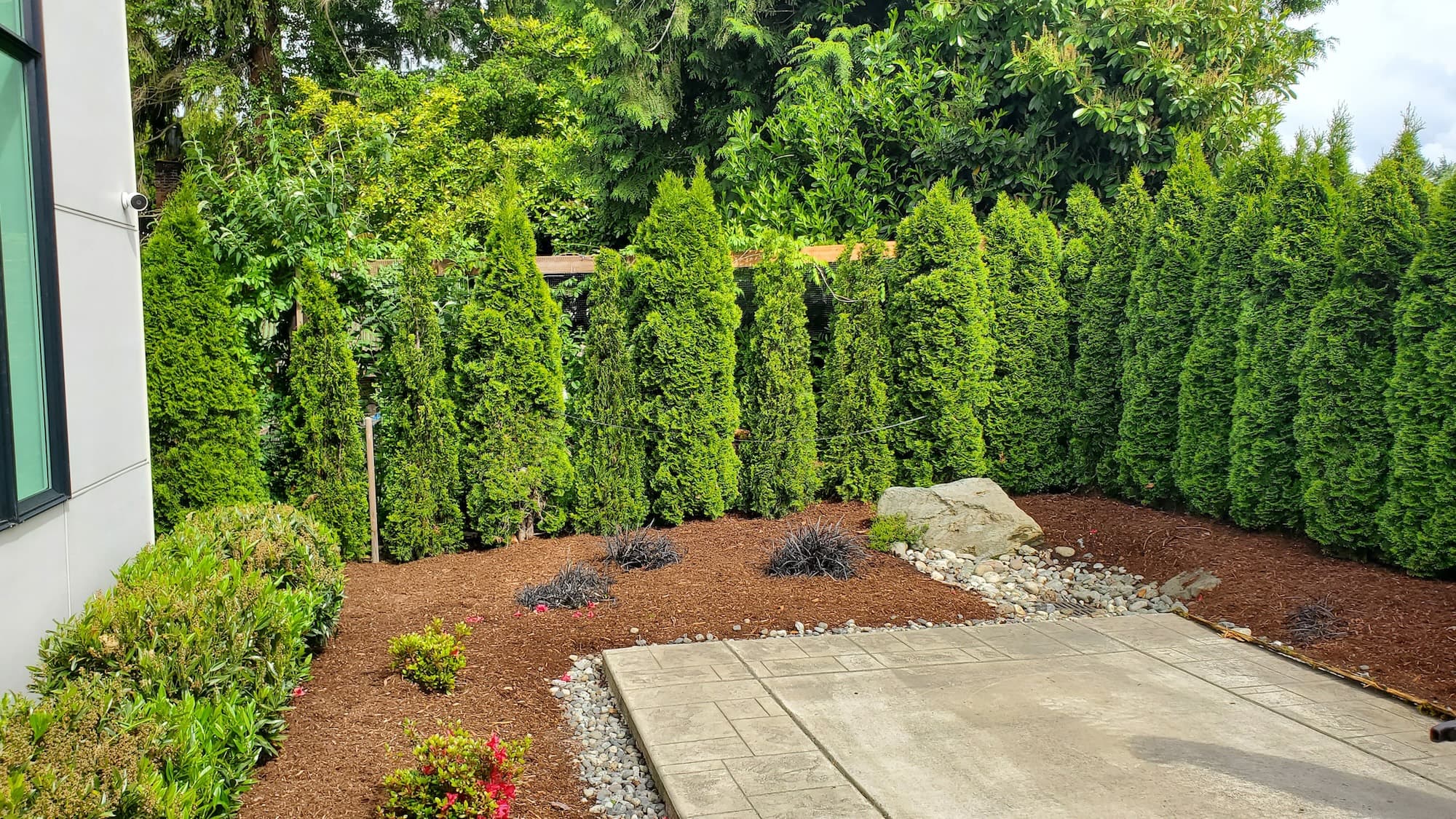West Seattle Seasonal Dyed Mulch Change
Homeowner’s Issue
West Seattle yards face a set of repeating problems: heavy winter rain, shaded corners that encourage moss, clayey glacial soils in some pockets, and sunny south-facing slopes that dry out faster. Beds near Lincoln Park, Alki, and the Admiral district get a mix of salt spray, compacted soil, and variable sun exposure that makes mulch break down unevenly and look patchy by late summer. Weeds and ivy exploit the damp, shaded north sides and slope run-off strips, while repeated foot traffic strips mulch from curb-facing beds hurting curb appeal. HOAs and neighbors on tight streets expect tidy edges and consistent color, but many folks don’t have time for seasonal refreshes.
A seasonal dyed mulch change solves several local headaches: it restores a unified look after winter washout, helps control erosion on short slopes, and adds a protective layer that retains moisture for drier spells. Doing this the right way in West Seattle means removing compacted old mulch, checking soil biology (not just topping up), and choosing sustainable dyed products that won’t leach synthetics into storm drains. Our approach emphasizes long-term yard health, reduced maintenance, and materials that work with Seattle’s climate rather than against it.
Our Quality Service
We remove old mulch, prep beds, and install fresh, environmentally safe dyed mulch using manual and light mechanized tools. Crews use rakes, battery pruners, wheelbarrows, and small mulchers when needed to keep noise and compaction low. Typical jobs on standard beds take a half to a full day; larger or steeper properties may take 1–2 days.
Local insight: West Seattle gets heavy rains Oct–Apr and dry windows in late spring and early fall for best mulch installs. Slopes near Alki and Admiral need extra anchoring and water management; clay pockets may get organic amendments to improve drainage. We follow Seattle’s compost/green bin rules and avoid herbicides—weed control is mechanical, thermal, or organic.
Benefits: safer, cleaner beds; improved curb appeal; reduced weeding; and a lower-maintenance landscape that lasts through the seasons.
What’s Included
- Inspection and bed assessment with recommendations.
- Removal and responsible disposal or green-bin composting of old mulch and light debris.
- Light soil loosening and organic amendment where needed.
- Even application of dyed mulch to your preferred depth.
- Bed edging and final cleanup.
Options / Upgrades:
- Mulch + landscape fabric (select areas) for longer life.
- Organic weed control (manual removal, steaming, or vinegar-based spot treatments).
- Soil amendments (compost, leaf mold) for heavy clay or compacted beds.
- Haul-away to a transfer station vs. green bin compost pickup (we follow city guidelines).
Before & After / Expectations
- Mess & noise: short-term — trucks, wheelbarrows, and rakes. We keep work contained and clean up daily.
- Access: we need clear driveway access or a nearby parking spot; tight sidewalks or stair access may add time.
- Debris: roots, old mulch, and trimmings will be hauled or placed in green bin per your choice; larger root balls may incur extra haul fees.
- Timelines: standard beds typically completed in one visit; plan more time for sloped or overgrown areas.
Care tips for West Seattle:
- Water new beds lightly only if a dry spell hits; late-spring installs don’t usually need watering.
- Expect higher weed pressure in early spring and after heavy rains—hand-weed or spot-treat organically.
- Watch shaded areas for moss and ivy; keep a 2–3” clear mulch layer and prune overhead to increase light where possible.
FAQs
Q: How often should I change dyed mulch in West Seattle?
- A: Plan on a seasonal refresh every 12–18 months for best appearance; heavier-traffic beds may need shorter intervals.
Q: Do dyed mulches harm plants or the soil?
- A: We use recycled wood mulches with eco-safe dyes. We avoid herbicides and synthetic soil additives; any amendments are organic.
Q: Can you handle steep slopes or erosion-prone areas?
- A: Yes. We use anchoring techniques, coir logs if needed, and organic amendments to stabilize soil before mulching.
Q: What about disposal — green bin or haul-away?
- A: We offer both. Green bin composting is usually preferred for yard waste; haul-away to a transfer station is available for larger loads.
Call to Action
If your West Seattle beds are faded, messy, or eroding, book a seasonal dyed mulch change with local pros who know Alki, Lincoln Park, and Admiral slopes. We schedule quickly, provide free estimates, and favor sustainable, low-toxicity methods. Email neatandtidyseattle@gmail.com or call 206-538-9344 to get a fast quote and available dates. Neat & Tidy — local, practical, and reliable for West Seattle yards.










